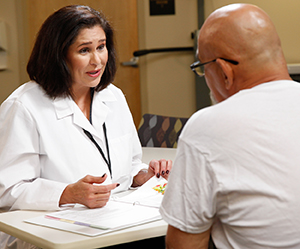A
B
C
D
E
F
G
H
I
J
K
L
M
N
O
P
Q
R
S
T
U
V
W
X
Y
Z
Topic IndexLibrary Index
Click a letter to see a list of conditions beginning with that letter.
Click 'Topic Index' to return to the index for the current topic.
Click 'Library Index' to return to the listing of all topics.
Kidney Disease: Choosing the Right Protein for Your Body
Choosing the right type and amount of protein you eat is important when you have chronic kidney disease. It can affect your overall health and kidney function.
Choosing the right amount of protein
If you have kidney disease but are not yet on dialysis, you will most likely need a low-protein diet. This helps slow down the speed at which your kidneys are failing. Your healthcare provider or a dietitian will calculate the amount of protein you can eat each day. It's based on the following:
Eat your daily protein
The amount of protein that you can eat each day may change with time. It's based on how well your kidneys are working. Your healthcare provider decides your protein intake by the stage of your kidney disease. Your body weight is also a factor. If your protein intake is decreased, you may need to eat more calories from other types of food. Carbohydrates, such as bread and pasta, are good choices.
Choosing the right type of protein
People with kidney failure have to limit the amount of phosphorus in their diet. But many proteins have a lot of phosphorus in them. Milk products are a good example.
Your choice of protein may also be limited because of cultural, religious, and social values. This may be the case with vegetarian, vegan, kosher, and halal diets. Registered dietitians (RDs) in the clinic and your healthcare team can work out the protein types and amounts best for you.

Online Medical Reviewer:
Raymond Kent Turley BSN MSN RN
Online Medical Reviewer:
Rita Sather RN
Online Medical Reviewer:
Walead Latif MD
Date Last Reviewed:
8/1/2022
© 2000-2024 The StayWell Company, LLC. All rights reserved. This information is not intended as a substitute for professional medical care. Always follow your healthcare professional's instructions.